|
1. A Message from the President 2. DPE Activities 3. PNND Activities 4. BSG Activities 5. MPI Activities |
|
1. A Message from the President
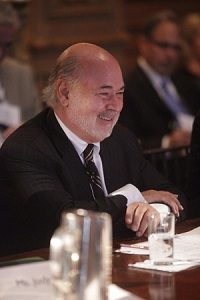 |
|
January is a time to reflect on the past year and present a vision for progress for the coming period. This is the report of a small civil society organization’s contributions to help end the unacceptable risks presented by the deployment of nuclear weapons in the pursuit of national security. Hopefully it will inspire everyone, especially those with greater power and capacity, to stronger, more effective actions.
In the affairs of nations, sometimes change is rapid, like the ending of the Cold War, and sometimes it is takes too long, like the ending of international violence in Europe. It is worthwhile to note, when possible, a starting point when the vision for change was put in place. It is that vision that helps the wise have a compass point for action at the opportune time.
Victor Hugo set forth an inspiring vision at the opening address to the Peace Congress in Paris, August 21, 1849:
A day will come when your arms will fall even from your hands! A day will come when war will seem as absurd and impossible between Paris and London, between Petersburg and Berlin, between Vienna and Turin, as it would be impossible and would seem absurd today between Rouen and Amiens, between Boston and Philadelphia. A day will come when you France, you Russia, you Italy, you England, you Germany, you all, nations of the continent, without losing your distinct qualities and your glorious individuality, will be merged closely within a superior unit and you will form the European brotherhood, just as Normandy, Brittany, Burgundy, Lorraine, Alsace, all our provinces are merged together in France. A day will come when the only fields of battle will be markets opening up to trade and minds opening up to ideas. A day will come when the bullets and the bombs will be replaced by votes, by the universal suffrage of the peoples, by the venerable arbitration of a great sovereign senate which will be to Europe what this parliament is to England, what this diet is to Germany, what this legislative assembly is to France. A day will come when we will display cannon in museums just as we display instruments of torture today, and are amazed that such things could ever have been possible.
It took nearly a century and the carnage of two world wars for substantive progress in realizing this vision. Today, we share with President Obama and Secretary General Ban Ki-moon the moral and practical imperative of achieving “the security of a world free of nuclear weapons” which would be a “public good of the highest value.” We believe we do not have the gift of a century for its achievement. We urge you to help make this vision a reality before time runs out.
Sincerely,

Jonathan Granoff
President
Your financial support of our work is critical to its continuation. Please consider making a gift to the work of GSI and our programs safely and securely online. We are also able to accept your donation through the world-trusted PayPal system.
|
|
2. Disarmament and Peace Education Activities
GSI hosts Secretary-General Ban Ki-moon on UN Day
On United Nations Day, October 24, GSI co-organized and co-hosted “Nuclear Disarmament: A Compass Point for Progress and Accountability” at the United Nations in New York. Working with co-sponsors the EastWest Institute and the James Martin Center for Non-proliferation Studies, the conference convened diplomats, arms control experts, UN agencies, former US military leadership, and other non-governmental organizations to synthesize an agenda with respect to international legal obligations on nuclear disarmament. Significantly, afternoon breakout sessions were co-hosted by the Permanent Missions of Switzerland, Germany and Kazakhstan.
Following introductions by GSI President Jonathan Granoff and EWI President Francis Finlay, Secretary-General Ban Ki-Moon delivered the keynote to a packed house emphasizing the need for increased transparency and accountability, as well as the urgent need to strengthen the rule of law in nuclear disarmament obligations. Secretary-General Ban also reiterated his 2008 call for work on a nuclear weapons convention.
Watch the entirety of the Secretary-General’s presentation:
The conference marked the three year anniversary the Secretary-General’s Five Point Proposal, a comprehensive agenda for eliminating nuclear weapons.
The day ended with the Permanent Mission of India graciously hosting a reception to honor the day’s co-hosts, and the work of Mani Shankar Aiyar, who chaired an informal advisory group of India Prime Minister Manmohan Singh (see India and the Elimination of Nuclear Weapons, below). Deputy Permanent Representative Manjeev Singh Puri hosted the private reception for UN ambassadors and community experts, and delivered an informal, uplifting presentation.
» View a photo gallery of the day’s events; view more photos on Flickr
» Watch the plenary presentation by Jonathan Granoff
» Read the report of the event from the UN News Centre
» Read the report of Mr. Aiyar’s presentation published in The Economic Times
» Download the conference description and program
Promoting the Secretary-General’s Five Point Proposal
 |
|
Panelist Ambassador James Goodby responds to a question from Dr. John Burroughs of LCNP (not pictured here) question regarding his proposal for a framework of instruments. |
|
In conjunction with the UN Day events, forty diplomats and civil society experts gathered at the Permanent Mission of Switzerland to the United Nations to participate in a workshop titled “Nuclear Weapons Convention or Framework of Agreements: Exploring Proposals for Nuclear Disarmament,” organized by the Global Security Institute. Despite a wide variety of approaches presented in the session, all participants agreed on the similar strategy expressed by Secretary-General Ban Ki-moon’s Five Point Proposal, one that has at its core the principle of universality.
Speakers included Ambassador Benno Laggner of Switzerland, Ambassador James Goodby of the Hoover Institution, Ambassador Jayantha Dhanapala of Pugwash, and Ambassador Robert Grey, Jr. of the Bipartisan Security Group.
» Read a summary of the Swiss workshop
» Read the full transcript of Ambassador James Goodby’s presentation
A formal report of the events, with substantial policy recommendations, is presently in production.
Advancing International Humanitarian Law
In partnership with the Swiss Federal Department of Foreign Affairs, GSI is effectively promoting international humanitarian law (IHL) as a framework for addressing the moral, legal, and social impacts of the continuing possession of nuclear weapons by states, and the dangers that such weapons continue to have on peace and security. The applicability of IHL to nuclear weapons was reinforced by the 2010 NPT Review Conference, which “express(ed) its deep concern at the catastrophic humanitarian consequences of any use of nuclear weapons, and reaffirms the need for all states at all times to comply with applicable international law, including international humanitarian law.”
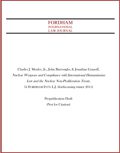 |
|
As a part of this work to promote IHL as a useful tool to advance disarmament, GSI helped author two articles:
- “International humanitarian law and nuclear weapons: Irreconcilable differences,” co-authored by Dean and Jonathan Granoff, Bulletin of the Atomic Scientists, November/December 2011 vol. 67 (6) 53-62.
We would like to express our appreciation to the Bulletin for printing Special Editions of the article, and for permitting it to be available for free. Further, we strongly urge anyone interested in international security affairs to subscribe to its online edition.
- “Nuclear Weapons and Compliance with International Humanitarian Law and the Nuclear Non-Proliferation Treaty,” co-authored by Charles J. Moxley, Jr., Dr. John Burroughs and Jonathan Granoff. Fordham International Law Journal, No. 34.
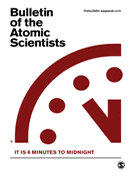
This article is one of the most comprehensive scholarly articles on the subject and has been widely circulated to leading parliamentarians, diplomats, lawyers, and policy makers the world over. This report includes only some of the venues for its distribution and discussion.
Other recent publications, including the MPI brief “A Global Law“, the Nuclear Abolition Forum flagship issue, the URI Call of Conscience and Alyn Ware’s most recent Huffington Post editorial, have also situated IHL as an effective framework for nuclear weapons policy.
Additionally, PNND has been working with its member parliamentarians on advancing IHL’s applicability to nuclear weapons through national efforts. Some suggested parliamentary actions PNND has proffered to its members include:
1. Endorsing the Vancouver Declaration;
2. Contacting the national section of Red Cross/Red Crescent to see what they are planning to do to implement the November 2011 ICRC resolution on the irreconcilability of nuclear weapons with IHL;
3. Submitting the Vancouver Declaration and the Red Cross/Red Crescent resolution to the parliament;
4. Affirming the criminality of nuclear weapons use;
5. Calling on the government to join with others in commencing negotiations on a global ban on nuclear weapons. (See A Global Law to Ban Nuclear Weapons)
Launching the Nuclear Abolition Forum
On October 21, the Nuclear Abolition Forum: Dialogue on the Process to Achieve and Sustain a Nuclear Weapons Free World was launched at the United Nations office of Baha’i International, alongside the release of the inaugural edition of the Forum’s periodic magazine.
The Forum is a joint project of eight co-sponsoring organizations, Albert Schweitzer Institute, Global Security Institute (GSI), International Association of Lawyers Against Nuclear Arms (IALANA), International Network of Engineers and Scientists Against Proliferation (INESAP), International Physicians for the Prevention of Nuclear War (IPPNW), Middle Powers Initiative (MPI), Pugwash (Canada and Denmark branches) and the World Future Council (WFC). An additional sixty-four disarmament experts serve as consultants. It is hosted by the WFC’s London Office.
 |
|
The Forum consists of a dedicated website for posting articles and discussing key nuclear abolition aspects and initiatives, and a periodical (available in hardcopy and as online PDF), which will focus on specific issues and elements (technical, legal, institutional and political) for achieving and sustaining a world free of nuclear weapons. The inaugural issue of the magazine has as its theme the application of International Humanitarian Law to nuclear weapons and comprises articles from a range of experts. Please click here to download the pdf. Hard-copies are available from the UN Office of the Lawyers Committee on Nuclear Arms and the London Office of the World Future Council. Donations to cover postage and packaging are appreciated.
 |
|
UN High Representative Sergio Duarte and Rosalyn Cook of the World Court Project UK |
In his opening remarks at the launch event, the United Nations High Representative for Disarmament Affairs, Sergio Duarte, highlighted the appropriateness of the Forum’s first issue to focus on the application of international humanitarian law to nuclear weapons. “Victor Hugo once wrote that ‘You can resist an invading army; you cannot resist an idea whose time has come’—and IHL surely represents one of those ideas,” Ambassador Duarte remarked. He went on to “welcome the emphasis placed by the architects of the Nuclear Abolition Forum in rekindling and sustaining a dialogue over fundamental questions relating to the achievement of nuclear disarmament,” and “commend it not just to all who already support abolition, but to all who still have an open mind to learning about what it has to offer, which is considerable.”
Founder of the Nuclear Abolition Forum, PNND Global Coordinator Alyn Ware, gave some insight into the rationale behind its establishment. “The vision for a nuclear weapons-free world has recently been advanced by leaders and high-level officials of key countries, including those possessing nuclear weapons. However, there are many challenges that need to be overcome and questions still to be addressed in order for governments to agree to abolish nuclear weapons. This independent forum provides a space to discuss, explore and find solutions to these issues.”
Director of the Forum, Rob van Riet, explained what the Forum entails and how some of its interactive features work. “The Forum essentially does three things: first, it offers information on nuclear abolition-related issues; second, it provides a platform for users to share their thoughts on such issues; and third, it facilitates and fosters debate on some of these issues.” Mr. van Riet explained how, next to the website, each edition of the Forum’s periodical will focus on a specific issue, the rationale behind this approach being that “edition-by-edition such key nuclear abolition aspects will be examined and critiqued, thereby paving the way for building the framework for achieving and sustaining a nuclear weapons-free world.”
 |
|
Dr. John Burroughs, Executive Director, Lawyers Committee on Nuclear Policy |
John Burroughs of the Lawyers Committee on Nuclear Policy, who was Expert Editor for the inaugural issue, took the audience through the edition and noted how a focus on international humanitarian law can help move the debate “from national security to human and environmental security, from military requirements and doctrines to effects on human beings, their societies, and their environments, and from controlling the weapons to abolishing them.” In addition, he underlined the political opening for making progress on advancing such humanitarian approaches to nuclear disarmament, noting the Final Document of the 2010 Nuclear Non-Proliferation Treaty Review Conference, which declared that the Conference “expresses its deep concern at the catastrophic humanitarian consequences of any use of nuclear weapons, and reaffirms the need for all states at all times to comply with applicable international law, including international humanitarian law.”
Finally, Reto Wollenmann, Counsellor at the Swiss Mission to the UN in Geneva, talked about how governments could benefit from having an independent forum devoted to fleshing out key aspects to nuclear abolition. He highlighted the importance of governments and civil society working together on advancing nuclear disarmament and expressed the hope that the Forum could facilitate such cooperation. Mr. Wollenmann noted to the readiness of the Swiss government to partake in the Forum.
A Call for Abolition from the Central Asian Steppe
From October 12-13, GSI President Jonathan Granoff and PNND Global Coordinator Alyn Ware participated in the “International Forum for a Nuclear Weapons-Free World” organized by the Government of Kazakhstan. The conference, hosted by President Nulsultan Nazarbayev, included scientists, experts, politicians and representatives from different countries, including a high level delegation from the United States lead by the Deputy Secretary of Energy Dan Poneman with a direct message from President Obama, and the heads and representatives of international organizations including the United Nations, the International Atomic Energy Agency, and the Comprehensive Test-Ban Treaty Organization, represented by the heads of those organizations, CTBTO Executive Secretary Tibor Tóth and IAEA Director-General Yukiya Amano. Emphasizing a strong relationship with the US government on issues of nuclear security, the US delegation was led by the Deputy Secretary of Energy Dan Poneman, and included Assistant Secretary of State for the Bureau of Arms Control, Verification and Compliance Rose Gottemoeller, Assistant Secretary of Defense for Nuclear, Chemical, and Biological Defense Programs Andrew Weber and Laura S. Holgate, Senior Director of WMD Terrorism and Threat Reduction on the National Security Council. Delivering a message from President Obama, Poneman applauded Kazakhstan’s leadership in nuclear security. Poneman also remarked that “the choice faced by Kazakhstan 20 years ago – either to cling to its inherited nuclear stockpile of more than 1,400 nuclear warheads, or to embrace a future as a leader of a world free of nuclear weapons – has had a dramatic impact on the global community and nuclear security efforts worldwide.”
The Forum issued a declaration calling for a world without nuclear weapons urging all nations to “pursue further practical steps and effective measure toward the total elimination of nuclear weapons.”
Held on the 20th anniversary of the closing of the Semipalatinsk test site of the Soviet Union, delegates to this high level conference were invited to travel beyond the capital, Astana, and to visit the notorious location which suffered 456 nuclear tests, from 1949 through its closing in 1989.
Deputy Foreign Minister Kairat Umarov, who had led civil society efforts to close Semipalatinsk, speaks from the Soviet testing “epicenter”, which he hopes will reinvigorate global efforts to finally ban all nuclear weapons tests, and work towards a nuclear weapons-free world.
The intensity of the Semipalatinsk site was also captured by many other conference delegates, who recorded their own messages from the Kazakh “ground zero”, including CTBTO Executive Secretary Tibor Toth and GSI President Jonathan Granoff:
» Read the conference transcript of Jonathan Granoff’s presentation, “Words Into Action“
Ongoing work with the United Religions Initiative
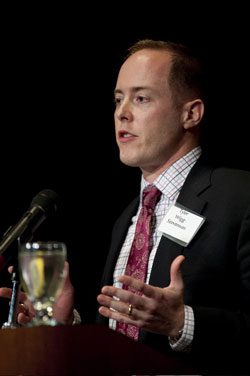 |
|
Rev. Stevenson delivering a luncheon keynote at the MPI Atlanta Consultation 2010 |
On September 20, the United Religions Initiative (URI) hosted a conference “wake-up call” on responding to the threat of nuclear weapons. Peace, security and disarmament leaders discussed the spiritual, financial, political and scientific urgency in mobilizing a coordinated response from people of faith and moral conviction. Speakers included: Mairead Corrigan Maguire, 1976 Nobel Laureate; Sidney Drell of the Hoover Institution; GSI President Jonathan Granoff; and Rev. Tyler Wigg-Stevenson, Founder and Director of the Two Futures Project and GSI Board Member.
This “wake-up call” is part of the ongoing efforts of URI, which, through its Voices for a World Free of Nuclear Weapons working group (or “Cooperation Circle”) released the “Call to Conscience: A Ban on Nuclear Weapons” last February.
» Listen to the presentations
» Download the transcript
» Learn more about this global, interfaith cooperation circle working to eliminate nuclear weapons.
India and the Elimination of Nuclear Weapons
An informal advisory group established by Indian Prime Minister Manmohan Singh in 2010 issued a report asserting that “India can and must play an effective and credible role as the leader of a campaign for the goal of universal nuclear disarmament. The advisory group was tasked to review, modernize and advance the 1988 Rajiv Gandhi Action Plan for a Nuclear-Weapons-Free and Non-Violent World Order.
 |
|
PNND Council Member Mani Shankar Aiyar is honored by Ambassador Puri and Mr. Granoff |
|
The Chairman of the group, Hon. Mani Shankar Aiyar, presented the report to the international community at the GSI-EWI-CNS consultation on United Nations Day, 2011. As a Member of the Indian Parliament, Mr. Hon. Aiyar is a Council Member of Parliamentarians for Nuclear Non-proliferation and Disarmament. He is also a former advisor to Prime Minister Rajiv Gandhi.
The report adopts many recommendations advanced by GSI, including those presented by former MPI Chairmen Douglas Roche and Ambassador Richard Butler, at the Rajiv Gandhi Commemorative Conference in 2008 and published in the book “Towards a Nuclear Weapon Free World,” edited by Dr. Manpreet Sethi, a member of the Advisory Group.
The report further demonstrates the influence of the personal testimony of PNND Coordinator Alyn Ware to the Advisory Group earlier this year, as well as the letter sent to Prime Minister Singh and Congress President Sonia Gandhi by the World Academy of Art and Science, which was based on GSI President Jonathan Granoff’s presentation to the WAAS in Delhi (attached as an annex to the letter).
3. Parliamentarians for Nuclear Non-proliferation and Disarmament Activities
The PNND Annual Assembly
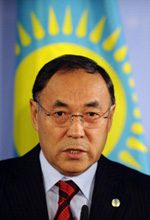 |
|
Kazakhstan Secretary of State Kanat Saudabayev |
Parliamentarians from 14 countries attended the 2011 PNND Annual Assembly in Bern, Switzerland, joined by titled “Building the Framework for a Nuclear Weapons-Free World: The role of parliamentarians.”
The PNND Assembly was held just prior to the 125th Assembly of the Inter-Parliamentary Union, at which PNND participated particularly as keynote speakers in the Special Session on “The Road to Zero Nuclear Weapons.”
The PNND conference included excellent presentations and stimulating discussion in five regular sessions: New Opportunities, Initial Measures, Regional Measures, Implementing the prohibition norm (national and international measures) and Building political momentum – starting the negotiations. In addition, there were two Special Sessions on “City, regional and national legislators – a new framework for common security,” and “Nuclear abolition, and Uncontrollable in time and space – links between nuclear energy and weapons.”
Along with the parliamentarians from Argentina, Bangladesh, Costa Rica, Ecuador, Iceland, Italy, Japan, Kazakhstan, New Zealand, Scotland, Switzerland, Tanzania, United Kingdom and Zimbabwe, diplomats and representatives from partner organizations also participated, including Peace Boat, Abolition 2000, Mayors for Peace, Nobel Peace Laureate Summits, Inter Parliamentary Union, World Future Council, Peace Depot, Israel Disarmament Movement, Comprehensive Test Ban Treaty Organisation, Parliamentary Forum on Small Arms and Light Weapons, Real Aid Campaign, International Campaign to Abolish Nuclear Weapons and Green Cross (see attached participants list).
|
Video message to the Assembly from
UN High Representative Sergio Duarte |
Video message to the Assembly from PNND Co-President US Representative Ed Markey
|
Keynote speaker Kanat Saudabayev, Secretary of State for Kazakhstan, used the opportunity to invite PNND to hold its 2012 Assembly in Kazakhstan from Augus 27-31t, during the 21th anniversary of the closing of the Semipalatinsk test site and the transition of Kazakhstan from a nuclear weapons possessor (inherited from the Soviet Union) to a non-nuclear weapon state.
» Read more information about the Assembly, including links to transcripts, photos, and other resources.
Freeze the Nukes – Fund the Future
 |
|
PNND Co-President Ed Markey presenting in US Congress |
On October 11, PNND Co-President Ed Markey led an effort in the US Congress to reduce spending on nuclear weapons. Markey sent a joint congressional letter, endorsed by 65 other members of congress, to the Super Committee which is considering budget cuts in order to reduce US debt in the wake of the global financial crisis. The letter notes that, with the end of the Cold War, it does not make sense that US spending on nuclear weapons has increased to US $70 billion annually, and that this level of spending is robbing future generations in order to pay for weapons of the past. The letter calls for a reduction of $20 billion per year – and a re-investment of these funds in the economy.
» Read the press release from Congressman Markey’s office
A Middle East Zone free of Nuclear Weapons and other Weapons of Mass Destruction
On October 16, PNND opened for endorsement a Joint Parliamentary Statement for a Middle East Zone Free from Nuclear Weapons and all other Weapons of Mass Destruction (also available in Arabic, French, Hebrew, Japanese, Greek and Spanish) commending the United Nations for its leadership, including the appointment of a host country and facilitator for an international conference in 2012 on establishing such a zone. PNND invites parliamentarians from the Middle East and from around the world to endorse the Joint Parliamentary Statement. Send endorsements to alyn@pnnd.org. (For more information, see Parliamentarians vital in supporting a nuclear weapons-free Middle East).
 |
|
PNND global coordinator Alyn Ware with parliamentarians in Jordan |
On November 30, PNND held a meeting in the Parliament of Jordan with members of the Assembly of Senators and the Chamber of Deputies to discuss the role of parliamentarians in supporting the establishment of a Middle East Zone free of Nuclear Weapons and other Weapons of Mass Destruction, including support for the Joint Parliamentary Statement. The parliamentarians, who included the chairs of the parliamentary committees on health and energy, were also interested in the health, environmental and proliferation risks of nuclear energy – in light of the Fukushima disaster and the consideration being given to the development of nuclear energy by the Jordanian government.
PNND is also working in collaboration with the Arab Institute for Security Studies and Peace Boat in joint initiatives to advance the process to achieve a Middle East Zone Free from Nuclear Weapons and all other Weapons of Mass Destruction. This has included the Amman Framework conference in Jordan on Nov 29-Dec 1, and a Horizon 2012 conference on the Peace Boat in March.
Advancing Global Parliamentary Actions
On October 17, the Inter-Parliamentary Union held a special session of its 125th Assembly in Bern on “The Path to Zero – parliamentary actions to implement the 2009 IPU resolution on nuclear non-proliferation and disarmament.” PNND reps speaking included PNND Co-President Raphael Chegeni (Tanzania, Chair of the Great Lakes Parliamentary Forum for Peace), PNND Co-President David Coltart (Minister for Education, Arts, Culture and Sports, Zimbabwe), PNND South East Asian Coordinator Matt Robson (Former Minister for Disarmament and Arms Control, New Zealand) and PNND member María Molina Crespo (Vice-President of the Parliamentary Commission on Natural Resources Commission, Ecuador). Key themes in the presentations included the illegality of nuclear weapons under international humanitarian law, the incompatibility of nuclear weapons with the human security needs of the 21st century, corruption of governments holding or pursuing nuclear weapons in the face of global opposition, and the increased feasibility of nuclear abolition in a globalized and technologically advanced world.
 |
|
PNND roundtable at the German mission New York |
On October 24, PNND organized a roundtable meeting at the German mission in New York on the topic of “Parliamentary Actions for Nuclear Disarmament.” The roundtable, which was held in conjunction with UN Day, was hosted by Ambassador Hellmut Hoffman and co-sponsored by the Parliamentarian Network for Conflict Prevention. The session had 40 participants including diplomats, parliamentarians, NGOs, and representatives from parliamentary organizations.
Building Support for Disarmament in the Swedish Parliament
On December 7, PNND co-hosted a seminar in the Swedish parliament on “A World without Nuclear Weapons.” Speakers include Alyn Ware (PNND Global Coordinator), Jonas Norling (Head of the Swedish Foreign Ministry Department for Disarmament and Non-Proliferation, Henrik Salander (former Swedish Disarmament Ambassador) and Eva von Oelreich (President of the Swedish Red Cross).
Partnerships and Expanding the PNND Network
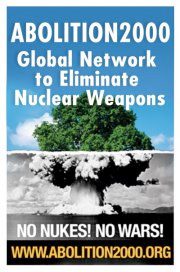 |
|
On September 16, at its Annual Meeting in Geneva, the Abolition 2000 Global Network to Eliminate Nuclear Weapons announced a parliamentary outreach campaign to help PNND achieve 2012 members by the end of 2012. Abolition 2000 has established a Parliamentary Outreach Working Group, and urges NGOs and other civil society representatives to contact their parliamentarians to encourage them to join PNND. Useful outreach documents include:
· PNND outreach brochure
· PNND Co-President’s letter inviting parliamentarians to join PNND
· PNND list of activities and achievements 2010 and 2011
· UN Secretary-General’s letter to all parliaments highlighting important role of parliamentarians and commending PNND
4. Bipartisan Security Group Activities
Widener University School of Law Event
On November 29, the Widener University School of Law hosted BSG Chairman Thomas Graham for, “A Discussion on Nuclear Disarmament with a Great American Ambassador: featuring US Ambassador Thomas Graham, Jr.”
 |
|
|
Ambassador James Goodby
|
BSG member joins high-ranking Advisory Board
Ambassador James Goodby joined and is actively participating on Secretary of State Clinton’s “International Security Advisory Board” which advises the US Department of State on all aspects of arms control, disarmament, international security, and related aspects of public diplomacy.
Space Security Briefing
BSG Member Dr. Nancy Gallagher chaired a briefing, co-sponsored by BSG and the Secure World Foundation, on outer space security. The briefing, held at the Carnegie Endowment for International Peace, included a presentation by Deputy Assistant Secretary of State Frank Rose, focused on the Obama Administration’s priorities in space security in 2012.
5. Middle Powers Initiative Activities
A Global Law to Ban Nuclear Weapons: revised ed.
In November, the revised edition of MPI Brief “A Global Law to Ban Nuclear Weapons” was released. The brief asserts that “it is urgent to seize the present opportunity, and to begin, soon, collective preparatory work leading to the enactment of a universal, verifiable, irreversible and enforceable legal ban on nuclear weapons. Such a ban would put an end to the grim spectacle of some states’ reliance on weapons whose use is palpably inhumane and also contrary to law governing the conduct of warfare.”
» Read the full brief
The Global Tour continues in Switzerland
Continuing last summer’s global tour to foreign ministries in Beijing, New Delhi, Moscow, Oslo, Sweden, Brussels, Berlin and London to present the MPI brief, “A Global Law to Ban Nuclear Weapons”, MPI Chairman Douglas Roche made stops in Switzerland this November with PNND Global Coordinator Alyn Ware.
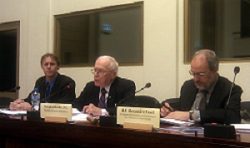 |
|
Alyn Ware, Senator Douglas Roche, Ambassador Alexandre Fasel |
On November 23, Ambassador Alexandre Fasel, Permanent Representative of Switzerland to the United Nations in Geneva, hosted and chaired a diplomatic roundtable at the Palais des Nations on “A Global Law to Ban Nuclear Weapons.” The two-hour session was attended by over 25 delegations to the Conference on Disarmament and had broader participation, including United Nations officials and representatives from disarmament non-governmental organizations.
The roundtable featured speeches by founding Chair of the Middle Powers Initiative, Senator Douglas Roche, and PNND Global Coordinator Alyn Ware.
The Switzerland leg of the tour also included meetings at the NGO Committee on Disarmament, the Geneva Security Policy Forum, the Inter-Parliamentary Union, the Red Cross and Red Crescent Societies, International Physicians on the Prevention of Nuclear War, the Center for Security Studies and the World Future Council.
6. GSI In the Media
- BSG member James Goodby and Nathan Pyles, “Reagan & Reykjavik,” The Hill, November 21, 2011.
GSI Board of Directors Member Rev. Tyler Wigg-Stevenson, “More than Moralism: How Values Matter to Nuclear Security,” in the Review of Faith & International Affairs, August 2011. - BSG Member Dr. Nancy Gallagher, “International Security on the Road to Nuclear Zero,”The Nonproliferation Review, Vol. 18, No. 2, 2011.
- BSG member James Goodby and Tyler Wigg-Stevenson in “Deterrence: Its Past and Future“
- MPI ISC member Dr. David Krieger, “Purpose, Ethics and Nuclear Weapons,” Counterpunch.org, August 26-28, 2011.
- BSG former member Rose Gottemoeller, “A ‘New START’ for arms control,” The Hill, December 22, 2011.
- GSI Program Officer Dean Granoff with GSI President Jonathan Granoff, “International humanitarian law and nuclear weapons: Irreconcilable differences,”Bulletin of the Atomic Scientists, November/December 2011 vol. 67 (6) 53-62.
- Charles J. Moxley, Jr., MPI ISC Member Dr. John Burroughs and GSI President Jonathan Granoff, “Nuclear Weapons and Compliance with International Humanitarian Law and the Nuclear Non-Proliferation Treaty,”Fordham International Law Journal, No. 34.
The Global Security Institute is dedicated to strengthening international peace and security based on co-operation, diplomacy, shared interests, the rule of law and universal values. Our efforts are guided by the skills and commitment of our team of former heads of state, distinguished diplomats and politicians, celebrities, religious leaders, Nobel Peace Laureates, disarmament and legal experts, and concerned informed citizens. Our focus is on controlling and eliminating humanity’s greatest threat – nuclear weapons.









